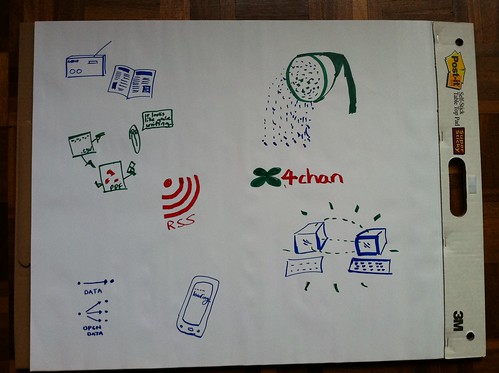I had a fun day yesterday at the Civil Service Fast Stream conference, which was focusing on big society type stuff. I was running a session on open government, with a concentration on open data.
As a bit of fun, while we were talking I asked the members of the group to draw what occurred to them when thinking about open data.
If you click the photo, you’ll be taken to the original on Flickr, which I have annotated with what I remember of the descriptions from the artists.
Once again, in a conversation about open data, I ended up coming across as being somewhat sceptical.
I’m all in favour of transparency in government, and I’m also very much in favour of public services publishing their information in accessible formats.
What I’m not so sure about are some of the claims made for the potential of open data to transform government, and its relationship with citizens.
I can’t see where the business model is for third parties to create applications based on this data, unless government itself pays. I’m also unconvinced that there are enough people around with the skills (and indeed the inclination) to either be effective armchair auditors or civic hackers all over the country.
I suspect the biggest users of open data will end up being journalists, and the work that newspapers such as The Guardian are already doing seems to support this. It’s a good thing, but hardly sees a great redrawing of the traditional ways of doing things.
The other area where I can see benefit coming from an openness around information assets and a different attitude towards data is in the use of it by government itself. I agree with Andrea DiMaio that if open government is to become a reality, it is going to happen through the actions of public servants themselves, rather than from activists on the outside.
So, transparency is important. There are opportunities around open data, as well as challenges. Right now, though, I struggle to see how dramatic change will happen as a result of publishing data.
I’d be very happy to be proven wrong, though!




“I can’t see where the business model is for third parties to create applications based on this data”
If you let go of the transparency angle for a bit, and see data as raw material, there’s plenty of opportunity, and already plenty of businesses making money in the b2b and b2c markets.
Making money from government data? I’d be interested in your examples. I’ll concede there’s an angle here for suppliers, for whom analysis of procurement and spending data could be worth paying for. In terms of consumer products I can see existing businesses tacking public data driven add-ons to their services (like RightMove having schools performance data available near houses for sale, but I still having come across a compelling example of a new service someone would actually pay for that’s based on government open data. As I said in my post, am happy to be proven wrong on this.
That’ll be because they are going to make money out of it, so will not be broadcasting to the world how anyone else can do the same UNTIL they work out how to rather uniquely and cleverly add value to that base data maybe THEN they might tell the world.
I have no doubt (nor proof I should say) that this is in varying stages of happening right now…
Coordination of services between government units, governments and partners and between governments is where I see the most potential.
For instance in development, the open data will authorise NGO’s in the field, government services in the field, other governments to appreciate who does what.
If the actors are not completely unreasonable, they will orient their own actions on basis of what they know the other actors are doing. This could potentially lead to an enormous gain in efficiency.
The current way of doing division of labour, namely sitting in rooms and exchange information the PPT way and discuss who does what, will never be able to capture the needed flexibility.
Interesting stuff, but I wonder where Govt recovers the cost of collecting and collating the data, if it is all being distributed freely.
For example the Met Office, as a Govt agency, spends a lot of public money on its satellite and radar observation systems, and as well as charging its internal Govt customers it seeks to recoup costs from selling the data commercially. The private forecast companies would love to get their hands on all the Met Office’s model and observational data for free, but it is such a small market I can conceive of no exponentiation growth that would generate the tax revenues to replace the charges that currently subsidise the public services currently provided.
Much of the raw Govt data is “interesting” to geeks but there is very little in the way of tools and advice to give it any context and although there are a few websites that are starting to try and offer some uses for the data but it remains “interesting” rather than a useful tool that can create “new” wealth or whatever.